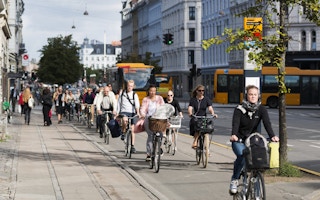Investments to help fight climate change can also spur economic growth, rather than slow it as widely feared, but time is running short for a trillion-dollar shift to transform cities and energy use, an international report said on Tuesday.
The study, by former heads of government, business leaders, economists and other experts, said the next 15 years were critical for a bigger shift to clean energies from fossil fuels to combat global warming and cut health bills from pollution.
“It is possible to tackle climate change and it is possible to have economic growth at the same time,” Felipe Calderon, a former Mexican president and head of the Global Commission on the Economy and Climate, told a news conference.
Many governments and businesses wrongly fear that measures to slow climate change will undermine jobs and growth, he said. The report is meant to guide world leaders at a Sept. 23 climate summit hosted by UN Secretary-General Ban Ki-moon.
Almost 200 nations are working on a UN pact, due to be agreed in Paris in late 2015, to rein in rising greenhouse gas emissions. Progress to combat global warming has been slow despite two decades of work.
“How the world’s largest and fastest-growing cities develop will be critical to the future path of the global economy and climate,” the report said, recommending a shift to “compact cities” that used less energy and invested in public transport.
“
A shift to low-carbon energy, such as wind or solar power, and greener cities would cost a further $270 billion a year - a 4.5 per cent increase in the bill that could be offset by other savings, for instance on fuel
Cities are home to half of the planet’s 7.2 billion people, generate 80 per cent of global economic growth and account for about 70 per cent of energy-related greenhouse gas emissions, it said. But many urban areas are sprawling out of control.
Time short
The report said the next 15 years were vital because, in that time, “the global economy will grow by more than half, a billion more people will come to live in cities” and new technology will change businesses and lives.
A UN panel of experts says swift action is needed to avert more heatwaves, floods, droughts and rising seas. It says it is at least 95 per cent probable that human activities, rather than natural swings in the climate, are the main cause of warming.
Overall, the Commission said that $90 trillion in investments were needed in the next 15 years to keep a high-carbon model of infrastructure for cities, transport, energy and water systems, or an average $6 trillion a year.
A shift to low-carbon energy, such as wind or solar power, and greener cities would cost a further $270 billion a year - a 4.5 per cent increase in the bill that could be offset by other savings, for instance on fuel.
“Investing in a low-carbon economy is a cost-effective form of insurance against climate risk,” it said.
Among drawbacks with the existing economy, the report said air pollution cost 4.4 per cent of world gross domestic product, with a high of more than 10 percent of GDP in China.
Jeremy Oppenheim, director of the report, said China and other emerging nations had grown aware of the risks of coal-based growth and fast-expanding cities. “Things are very different even compared with five years ago,” he told Reuters.
In rich nations, inefficiencies still abounded in cities such as New York, London or Paris. “Twenty per cent of fuel costs in cities are spent looking for parking spots,” he said.
Unlike past climate change studies which have focused on the risks of inaction, the report seeks to show economic benefits of investments which could also help the environment, he said.
The report urged governments to phase out fossil fuel subsidies totalling more than $600 billion a year, far more than $100 billion in annual support given to renewable energy.
And it urged better use of farmland. “Restoring just 12 per cent of the world’s degraded agricultural land could feed 200 million people by 2030, while also strengthening climate resilience and reducing emissions,” it said.
In April, a report drawing on the work of 1,000 experts said that a shift to low-carbon energy would trim about 0.06 per cent a year off world economic growth.
It did not compare costs and benefits as starkly as Tuesday’s report.
Nicholas Stern, a former World Bank chief economist who was a member of the commission, urged governments to abandon what he called an “artificial horse race” between economic growth and action to combat climate change.
“The challenge is to combine the two,” he said. “That is the only sensible route,” he said.

















